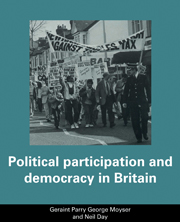Book contents
- Frontmatter
- Contents
- List of figures
- List of charts and maps
- List of tables
- Preface
- Part I Theories and methods
- Part II Patterns and pathways
- 3 Patterns of political participation
- 4 Individual resources
- 5 Group resources
- 6 Economic location
- 7 Personal factors
- 8 Political outlooks
- 9 Party and values
- 10 Who are the political activists?
- Part III Issues and actions
- Part IV The local process
- Part V Conclusions
- Appendix A Survey methods
- Appendix B Measuring elite-citizen concurrence
- Appendix C The National Questionnaire
- Endnotes
- Bibliography
- Index
6 - Economic location
Published online by Cambridge University Press: 03 May 2011
- Frontmatter
- Contents
- List of figures
- List of charts and maps
- List of tables
- Preface
- Part I Theories and methods
- Part II Patterns and pathways
- 3 Patterns of political participation
- 4 Individual resources
- 5 Group resources
- 6 Economic location
- 7 Personal factors
- 8 Political outlooks
- 9 Party and values
- 10 Who are the political activists?
- Part III Issues and actions
- Part IV The local process
- Part V Conclusions
- Appendix A Survey methods
- Appendix B Measuring elite-citizen concurrence
- Appendix C The National Questionnaire
- Endnotes
- Bibliography
- Index
Summary
One of the major tenets underlying the analysis of capitalist societies is that political outlooks and behaviour are fundamentally shaped by the pursuit of individual and group economic self-interest. We need, therefore, to consider how these economic factors impinge on political participation. This is especially the case if participation is, as it is widely conceived by theorists and respondents alike, principally an instrumental activity undertaken to realise goals or protect interests through political means.
However, to move from such an abstract conception to concrete indicators and tests is to move from near consensus amongst social analysts to confusion, conflict and even acrimonious debate (see, for example, Cotgrove 1982:93–4; Crewe 1986; Heath, Jowell and Curtice 1987). There is general agreement in other words that economic circumstances influence political action, but much less concurrence over the measures to be used to demonstrate the linkage, and therefore over the interpretations to be made and the conclusions to be drawn.
As the discussion in this chapter unfolds, some of the terms of the debate, and the detailed choices we have made will become plain. But our initial and most fundamental decision was to determine the set of measures of economic location to be deployed. In the event, we settled on four. These were, respectively, the politically sensitive distinction between those in employment, those unemployed and those economically inactive; secondly, class itself; thirdly, employment sector, distinguishing here between public and private; and finally a measure of consumption cleavages – the relative dependency of individuals on goods and services supplied by the public as against the private sector.
- Type
- Chapter
- Information
- Political Participation and Democracy in Britain , pp. 120 - 142Publisher: Cambridge University PressPrint publication year: 1992



